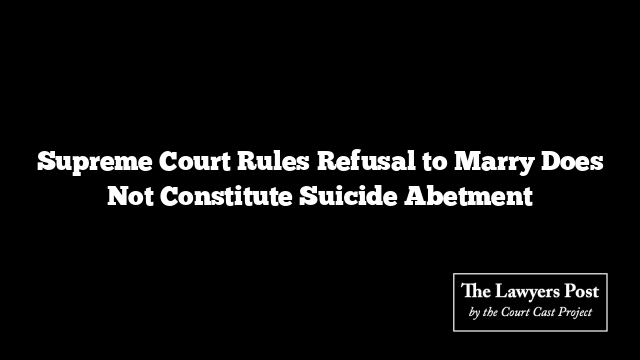In a recent ruling, the Supreme Court clarified that a refusal to marry cannot be considered as abetment of suicide under Indian law. The judgment came in the case of Kamaruddin Dastagir Sanadi, where the accused was acquitted of charges related to cheating and suicide abetment after a woman took her life following his rejection.
The Bench, comprising Justices Pankaj Mithal and Ujjal Bhuyan, emphasized that there was no concrete evidence proving the accused had either instigated or directly caused the woman’s tragic decision. The Court noted that the woman’s actions—consuming poison after being denied marriage—were premeditated, stemming from her personal emotional turmoil rather than any overt provocation by the accused.
According to the Court, despite the relationship between the two, the refusal to marry alone could not be seen as a criminal act leading to suicide. “It was the deceased herself who carried the poison, had a fixed intention to seek affirmation of marriage, and chose suicide when she did not receive the response she expected,” the Court observed. The ruling clarified that such a personal emotional response did not amount to criminal instigation.
The case began in 2007 when the woman, in her 20s, took her life after the accused allegedly broke his promise to marry her, a promise reportedly made during a village panchayat. While the prosecution argued that the man’s refusal triggered the suicide, the initial trial court acquitted him, citing lack of evidence for a physical relationship or intentional provocation. However, the Karnataka High Court later convicted him for cheating and abetment to suicide.
The Supreme Court, after reviewing the evidence—including the deceased’s dying declaration—found that there were no allegations of sexual misconduct or coercion. It also noted that the deceased had been the one pursuing the accused, tracking him down after he had left her village, and that no evidence suggested the man had incited her tragic act.
The ruling also addressed the absence of any written proof of the accused’s promise to marry, which was central to the prosecution’s case. Despite witness testimony about the panchayat proceedings, no documents were presented to confirm the marriage promise.
In conclusion, the Supreme Court set aside the lower court’s conviction, ultimately acquitting the accused of all charges.





